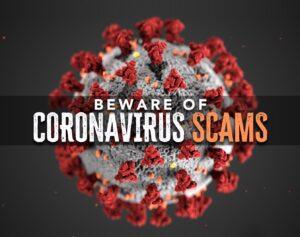Avoid Coronavirus Scams
AVOID CORONAVIRUS SCAMS
Here are some tips from the FTC to help you keep the scammers at bay:
Hang up on robocalls. Donât press any numbers. Scammers are using illegal robocalls to pitch everything from scam Coronavirus treatments to work-at-home schemes. The recording might say that pressing a number will let you speak to a live operator or remove you from their call list, but it might lead to more robocalls, instead.
Misinformation and rumors: Scammers, and sometimes well-meaning people, share information that hasnât been verified.
What to do: Before you pass on any messages, and certainly before you pay someone or share your personal information, do some fact checking by contacting trusted sources. For information related to the Coronavirus, visit What the U.S. Government is Doing. There youâll find links to federal, state and local government agencies.
Know who youâre buying from. Online Sellers may claim to have in-demand products, like cleaning, household, and health and medical supplies when, in fact, they donât.
What to do: Check out the seller by searching online for the person or companyâs name, phone number and email address, plus words like âreview,â âcomplaintâ or âscam.â If everything checks out, pay by credit card and keep a record of your transaction. If youâre concerned about the pricing of products in your area, contact your state consumer protection officials. For a complete list of state Attorneys General, visit naag.org.
Checks from the Government: Donât respond to texts and emails about checks from the government. The details are still being worked out. Anyone who tells you they can get you the money now is a scammer.
Fake emails, texts and phishing: Donât click on links from sources you donât know. They could download viruses onto your computer or device.
Watch for emails claiming to be from the Centers for Disease Control and Prevention (CDC) or experts saying they have information about the virus. For the most up-to-date information about the Coronavirus, visit the Centers for Disease Control and Prevention (CDC) and the World Health Organization (WHO).
Ignore online offers for vaccinations. There currently are no vaccines, pills, potions, lotions, lozenges    or other prescription or over-the-counter products available to treat or cure Coronavirus disease 2019 (COVID-19) â online or in stores.
Fake charities: When a major health event â like the Coronavirus â happens, you might be looking for ways to help. Scammers use the same events to take advantage of your generosity. Some scammers use names that sound a lot like the names of real charities. This is one reason it pays to do some research before giving. Money lost to bogus charities means less donations to help those in need.
What to do: Use these organizations to help you research charities. When you give, pay safely by credit card â never by gift card or wire transfer.
Want more information on the latest scams weâre seeing? You can sign up for the FTCs consumer alerts. If you come across any scams or suspicious claims, report them to the FTC at ftc.gov/complaint.

